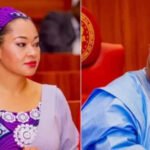Why has Nigeria’s Economic and Financial Crimes Commission (EFCC) decided to remain silent regarding the alleged fraud case against the suspended Minister of Humanitarian Affairs and Poverty Alleviation, Betta Edu?
Development Diaries reports that President Bola Tinubu had, in January 2024, suspended Edu from office and ordered the EFCC to investigate the financial crime allegations against her, following a public outcry on the issue.
However, since the EFCC released Edu on bail in January, Nigerians have yet to hear the details of the investigations so far.
According to findings by Daily Trust, the EFCC recommended that Edu be prosecuted. But the anti-graft commission had not denied this report at the time of this reaction.
Why have both the EFCC and the presidency failed to give Nigerians any updates on the results of the investigation?
Nigerians await the full details of the EFCC investigation to understand hidden facts about what actually transpired in the humanitarian ministry.
The concern over the silence is expected because this may lead to a lack of accountability for individuals involved in the financial crime, which could allow perpetrators to escape justice or manipulate the legal system.
Also, failure to keep citizens informed about the progress of investigations can widen the trust gap among citizens, the anti-corruption agencies, and the government. Transparency is crucial to maintaining public confidence and demonstrating a commitment to fighting corruption.
We hope that this silence will not provide an opportunity for those being investigated to interfere with the process.
Already, years of misgovernance have resulted in public distrust in government officials and government activities and programmes. President Tinubu and the EFCC must not worsen an already bad situation.
Development Diaries therefore calls on the EFCC to release its findings to the public to enhance transparency and accountability in government. This would ensure that citizens are informed about the progress of investigations and how public officials are being held accountable.
Photo source: Min of Humanitarian Affairs






